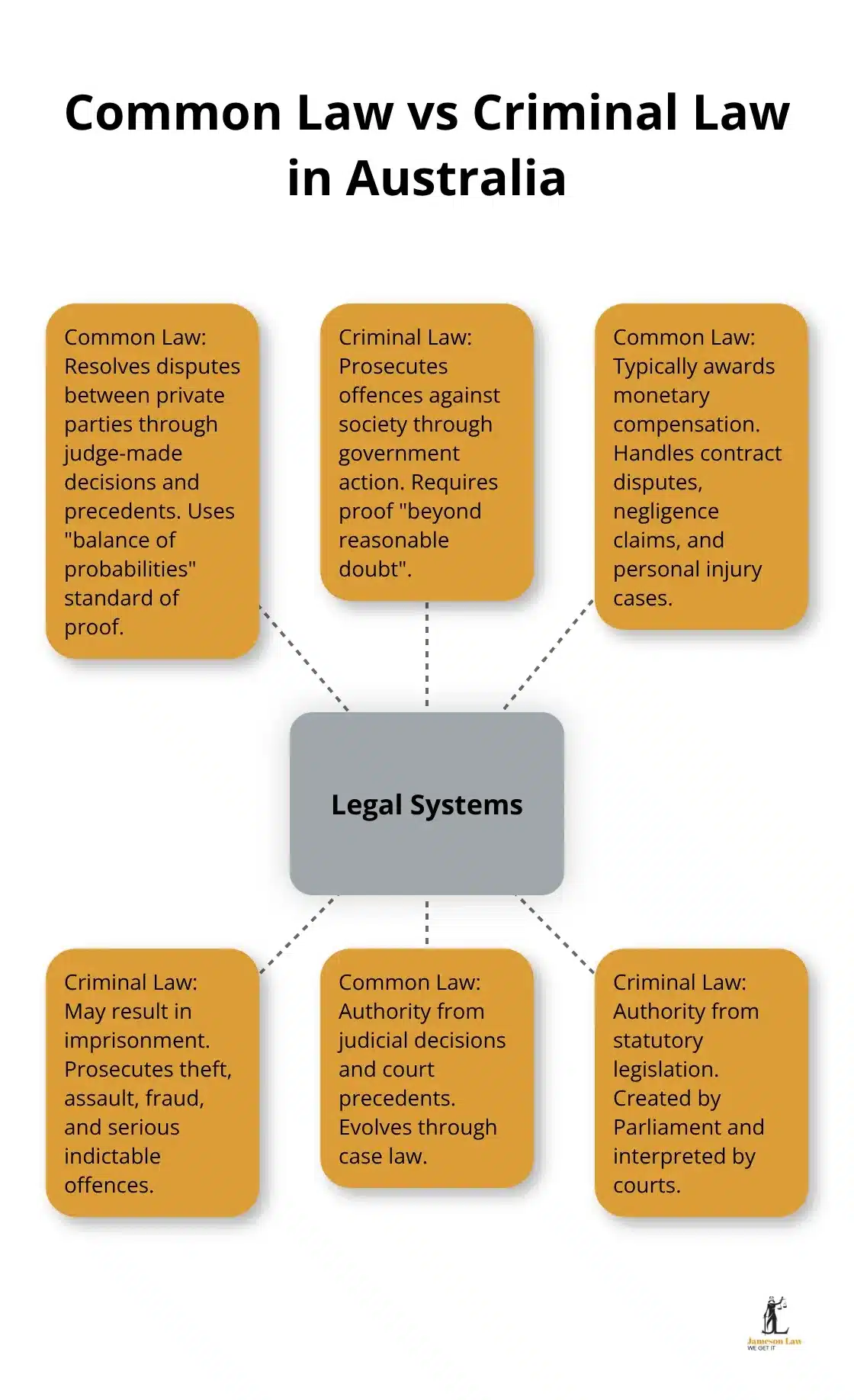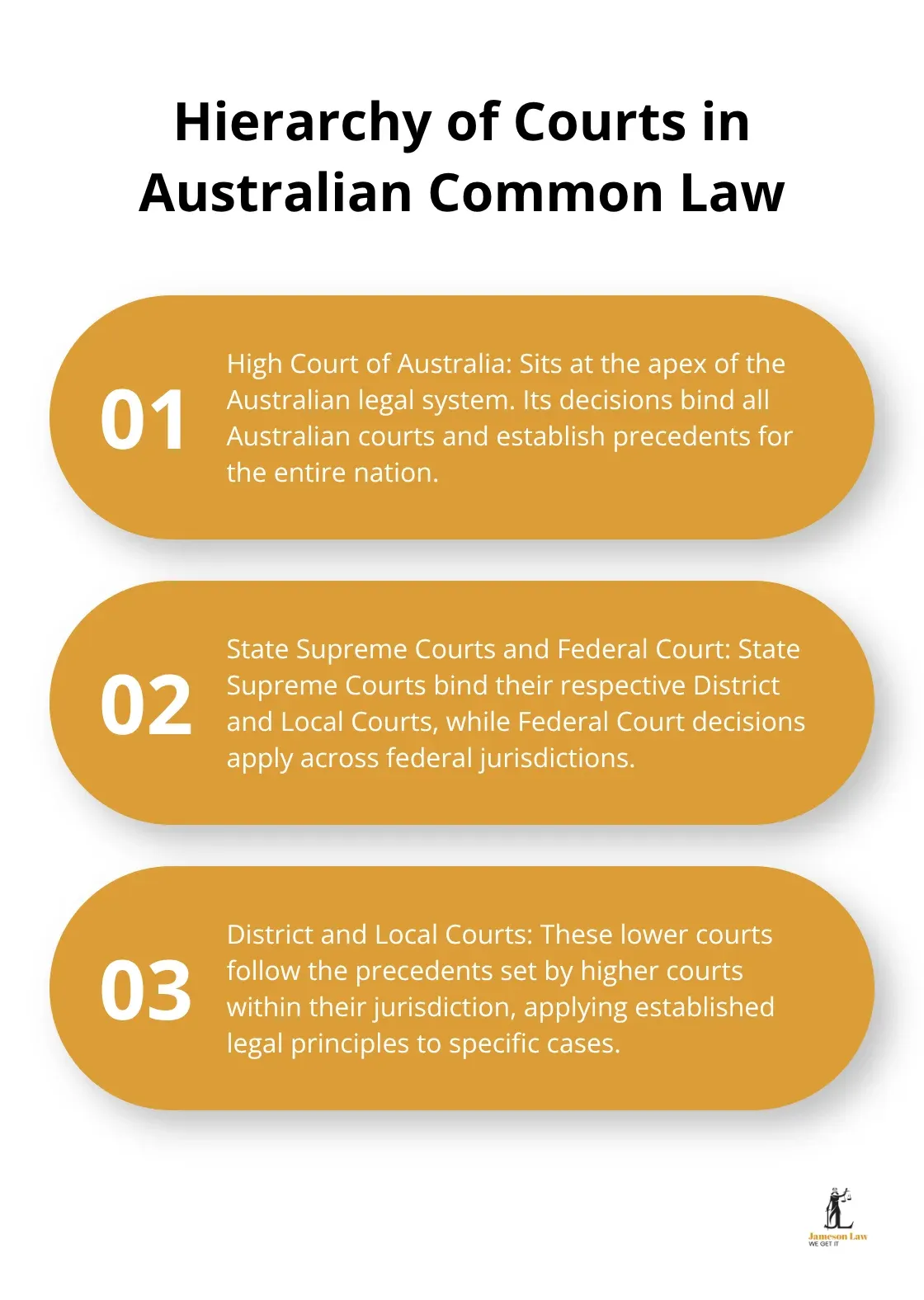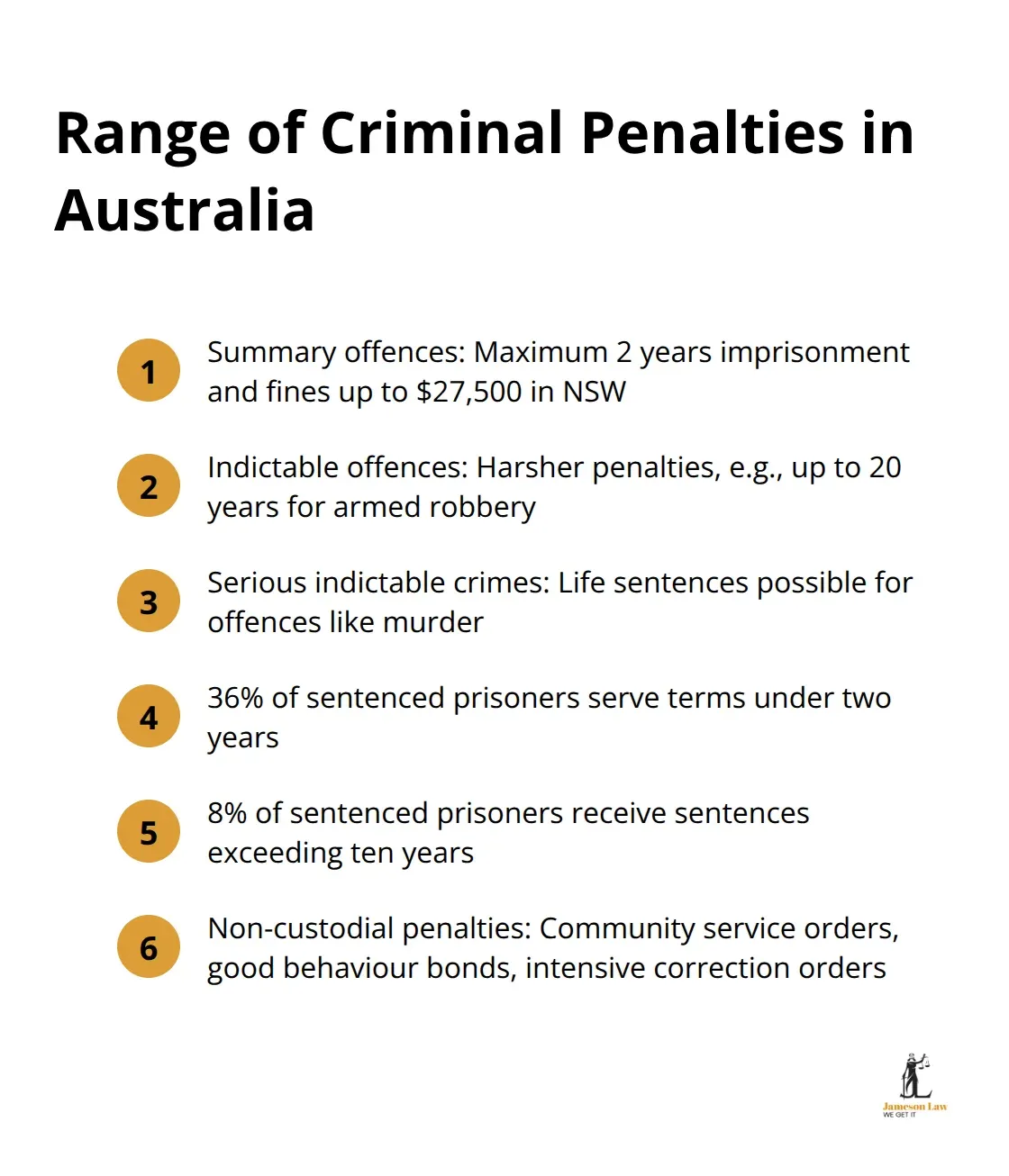Australia’s legal system operates through two distinct frameworks that serve different purposes and follow separate procedures.
Common law and criminal law each handle specific types of legal matters, from civil disputes to serious offences. We at Jameson Law see clients who often confuse these systems, which can affect decisions about rights, remedies and strategy.
Understanding these differences helps you navigate legal challenges more effectively. If you need tailored advice in NSW, our team can assist from the first call on (02) 8806 0866 or via our contact page.
What Sets Common Law Apart From Criminal Law
Common law resolves disputes between private parties using judge-made principles and precedent, while criminal law prosecutes offences against the community through action by the State. Civil courts deal with contracts, negligence and property. Criminal courts deal with charges such as assault, fraud and theft.
Different Legal Authority Sources
Common law draws authority from judicial decisions that become binding precedent. You can explore key judgments at High Court of Australia and Federal Court of Australia, with open access to legislation and cases via AustLII. Criminal law primarily operates under statute, including the Criminal Code Act 1995 (Cth) and State crimes Acts such as the Crimes Act 1900 (NSW). Parliament creates these offences and courts interpret and apply them.
Distinct Case Types and Outcomes
Common law covers contract disputes, negligence, personal injury and property matters where parties usually seek compensation or declarations. See our guides on personal injury and civil litigation. Criminal law addresses conduct that threatens public safety, with prosecutions brought by the State. In NSW, Local Courts handle most summary matters, while the District and Supreme Courts deal with indictable crimes and jury trials. For court information, see NSW Local Court and NSW Supreme Court.
Burden of Proof Standards
The burden of proof differs. Criminal cases require proof beyond reasonable doubt, which protects against wrongful conviction. Civil cases use the balance of probabilities standard, which asks what is more likely than not based on the evidence. For an overview of criminal procedure and rights, see our criminal law explainer and NSW Police information on rights.

These fundamental differences shape how each system approaches justice and resolution. Next we look at how common law works inside Australian courts.
How Does Common Law Function in Australian Courts
Judicial Precedent Creates Binding Legal Rules
Australian common law operates through precedent, which means higher court decisions bind lower courts in the same hierarchy. The High Court sits at the apex, with State Supreme Courts, District Courts and Local Courts below. You can read about the system at the AustLII journals hub and the Australian Law Reform Commission. Foundational negligence concepts developed through cases such as Grant v Australian Knitting Mills, building on Donoghue v Stevenson.

Case Law Shapes Legal Outcomes Through Practical Application
Common law develops case by case. The High Court’s decision in Mabo (No 2) recognised native title and has influenced land disputes ever since. Negligence principles from decisions like Wyong Shire Council v Shirt still guide risk assessments. Contract principles in Australian Woollen Mills v Commonwealth inform modern commercial disputes. For civil case strategy or settlement, speak with our civil litigation team.
Real-World Applications Demonstrate Common Law Impact
Common law governs claims for workplace injury, motor vehicle accidents and medical negligence. Personal injury practitioners rely on precedents such as Skelton v Collins for future economic loss and Chapman v Hearse on duty of care. If you have suffered harm, our personal injury lawyers can explain liability, evidence and time limits in NSW.
This precedent-based approach contrasts with criminal law, where prosecutions are brought under specific statutory offences.
How Does Criminal Law Operate in Australia
State Prosecutors Drive Criminal Cases Forward
Criminal cases are prosecuted by the State. The Commonwealth DPP handles federal offences such as fraud and terrorism. State Directors of Public Prosecutions handle serious State offences. See the NSW DPP for policy and guidelines. Police prosecutors run most summary matters in Local Courts. For court listings and process in NSW, visit Service NSW. If you or a family member has been charged, read our guides on bail in NSW and court representation.
Beyond Reasonable Doubt Sets the Criminal Standard
Criminal law requires proof beyond reasonable doubt. The prosecution must prove each element. Defendants have the right to silence and the presumption of innocence. For a plain-English primer on standards of proof, see Go To Court’s explainer and the Australian Institute of Criminology for criminal justice research.
Criminal Penalties Range From Fines to Life Imprisonment
Penalties reflect seriousness and deterrence. Summary offences can attract fines and short custodial terms. Indictable offences can lead to long imprisonment. Courts can also impose community-based sentences, including intensive correction orders under supervision. For sentencing principles and options, review your State legislation on NSW Legislation and sentencing guidance on NSW Sentencing Council.

Final Thoughts
Common law and criminal law serve different roles within Australia’s legal framework. Common law resolves private disputes through precedent and the balance of probabilities. Criminal law prosecutes offences against the community using legislation and proof beyond reasonable doubt. Which system applies depends on what happened and the remedy you seek. If another party’s negligence caused you loss, civil action may be appropriate. If you have been charged, criminal procedure and protections apply.
Getting advice early helps protect your position. Start with our common vs criminal law guide, then speak to our Sydney team on (02) 8806 0866 or make an enquiry here. We provide clear, practical guidance across civil disputes and criminal defence throughout NSW.













